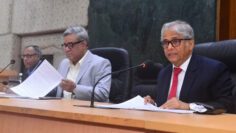‘Bangladesh has potential to earn $2 bln by exporting agri goods’
PBC News: Bangladesh has the potential to earn $2 billion by exporting agricultural goods, but growers and exporters lack knowledge of sanitary and phytosanitary (SPS) measures. This risks the country’s food safety and limits opportunities to export agricultural products. Implementation of proper SPS measures in all levels will not only ensure safe food for the people but also increased global competitiveness of the sector.
SPS measures such as end product criteria, quarantine measures, pest risk assessments, inspections of products, sampling and testing, health-related labeling, certification, setting of allowable maximum levels of toxins, contaminants, pesticide and drug residues, and others ensure that a country’s consumers are being supplied with food that is safe to eat while also ensuring that strict health and safety regulations are not being used as an excuse to shield domestic producers from competition.
These observations emerged from a virtual training program on ‘SPS and WTO Commitments for Bangladesh’ hosted by USAID funded Feed the Future Bangladesh Trade Activity on August 25-26, 2021.
The purpose of the training was to strengthen the capacity of relevant public and private sector stakeholders and provide them a common understanding of SPS-related issues to promote the export of agricultural products from Bangladesh. A total of 35 participants from agro-producers, exporters, trade associations, academic people, food business operators, FFV supply chain experts, and individual consultants, participated in the training program.
The main discussion points included SPS Agreements and its notification procedures; phytosanitary and importance of food safety harmonization; SPS-related trade problems; food safety standard and regulatory measures; implications for Bangladesh’s fish export; SPS regime in South Asia and how the Trade Facilitation Agreement (TFA) impacts SPS-related obligations.
This training will help the participants to follow the SPS Standard Operating Procedures (SOPs), guidelines and recommendations in their workplace and they will also be able to identify SPS problems in Bangladesh, evaluate problem-solving strategies and develop science-based solutions for the current challenges in SPS.
USAID-funded Feed the Future Bangladesh Trade Activity supports the Government of Bangladesh to bolster economic growth and food security by improving trade facilitation, enhancing market access, and improving the business enabling market. The Feed the Future Bangladesh Trade Activity provides technical assistance, training, institutional strengthening, and other direct support to the Government of Bangladesh and non-governmental partners. It also promotes greater collaboration among the government, private sector, and civil society organizations.



















